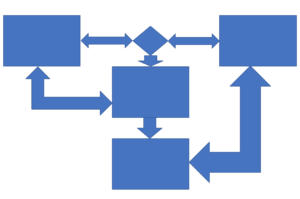A Co-Design Process Microanalysis: Stages and Facilitators of an Inquiry-Based and Technology-Enhanced Learning Scenario
 This paper presents a case study of the co-design process for an online course on Sustainable Development (Degree in Tourism) involving the teacher, two students, and the project researchers. The co-design process was founded on an inquiry-based and technology-enhanced model that takes shape in a set of design principles. The research had two main objectives. Firstly, to identify the moments of change that occur during the co-design process and secondly, to describe the causes and agents that motivate them. This study applied design-based research methodology and used a qualitative approach to collect, analyse, and interpret data. The results show that the co-design methodology led to moderate changes consisting of the progressive construction and refinement of the activities, seeking a sense of continuum throughout by including students’ collaboration. The findings also reveal the main role of each of the actors involved. Thus, the teacher focused on basic instructional design related aspects while students focused on improving the use of resources and learning aids. Researchers helped them to embody and achieve the proposed changes and also acted as mediators of pedagogical concepts and vocabulary. CompendiumLD software was a helpful tool to graphically represent and share the prototyping of the activities and to help analyse the design process.
This paper presents a case study of the co-design process for an online course on Sustainable Development (Degree in Tourism) involving the teacher, two students, and the project researchers. The co-design process was founded on an inquiry-based and technology-enhanced model that takes shape in a set of design principles. The research had two main objectives. Firstly, to identify the moments of change that occur during the co-design process and secondly, to describe the causes and agents that motivate them. This study applied design-based research methodology and used a qualitative approach to collect, analyse, and interpret data. The results show that the co-design methodology led to moderate changes consisting of the progressive construction and refinement of the activities, seeking a sense of continuum throughout by including students’ collaboration. The findings also reveal the main role of each of the actors involved. Thus, the teacher focused on basic instructional design related aspects while students focused on improving the use of resources and learning aids. Researchers helped them to embody and achieve the proposed changes and also acted as mediators of pedagogical concepts and vocabulary. CompendiumLD software was a helpful tool to graphically represent and share the prototyping of the activities and to help analyse the design process.
International Review of Research in Open and Distributed Learning







